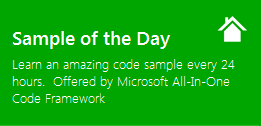[Sample of Mar 31st] Dynamically Load Native Library from .NET
 |  | |
 |  | |
Sample Downloads
C# version: https://code.msdn.microsoft.com/CSLoadLibrary-4f25687f
VB version: https://code.msdn.microsoft.com/VBLoadLibrary-40365581
Today’s code sample demonstrates dynamically loading a native DLL (LoadLibrary) get the address of a function in the export table (GetProcAddress, Marshal.GetDelegateForFunctionPointer), and call it from .NET. The technology is called Dynamic P/Invoke. It serves as a supplement for the P/Invoke technique and is useful especially when the target DLL is not in the search path of P/Invoke. If you use P/Invoke, CLR will search the dll in your assembly's directory first, then search the dll in directories listed in PATH environment variable. If the dll is not in any of those directories, you have to use the so called Dynamic PInvoke technique that is demonstrated in this code sample.
 You can find more code samples that demonstrate the most typical programming scenarios by using Microsoft All-In-One Code Framework Sample Browser or Sample Browser Visual Studio extension. They give you the flexibility to search samples, download samples on demand, manage the downloaded samples in a centralized place, and automatically be notified about sample updates. If it is the first time that you hear about Microsoft All-In-One Code Framework, please watch the introduction video on Microsoft Showcase, or read the introduction on our homepage https://1code.codeplex.com/.
You can find more code samples that demonstrate the most typical programming scenarios by using Microsoft All-In-One Code Framework Sample Browser or Sample Browser Visual Studio extension. They give you the flexibility to search samples, download samples on demand, manage the downloaded samples in a centralized place, and automatically be notified about sample updates. If it is the first time that you hear about Microsoft All-In-One Code Framework, please watch the introduction video on Microsoft Showcase, or read the introduction on our homepage https://1code.codeplex.com/.
Introduction
CSLoadLibrary in C# mimics the behavior of CppLoadLibrary to dynamically load a native DLL (LoadLibrary) get the address of a function in the export table (GetProcAddress, Marshal.GetDelegateForFunctionPointer), and call it.
The technology is called Dynamic P/Invoke. It serves as a supplement for the P/Invoke technique and is useful especially when the target DLL is not in the search path of P/Invoke. If you use P/Invoke, CLR will search the dll in your assembly's directory first, then search the dll in directories listed in PATH environment variable. If the dll is not in any of those directories, you have to use the so called Dynamic PInvoke technique that is demonstrated in this code sample.
Using the Code
The sample DLL exports these data, functions and classes:
// Global Data
int g_nVal1
int g_nVal2
// Ordinary Functions
int __cdecl GetStringLength1(PCWSTR pszString);
int __stdcall GetStringLength2(PCWSTR pszString);
// Callback Function
int __stdcall CompareInts(int a, int b, PFN_COMPARE cmpFunc)
// Class
class CSimpleObject
{
public:
CSimpleObject(void); // Constructor
virtual ~CSimpleObject(void); // Destructor
// Property
float get_FloatProperty(void);
void set_FloatProperty(float newVal);
// Method
HRESULT ToString(PWSTR pszBuffer, DWORD dwSize);
// Static method
static int GetStringLength(PCWSTR pszString);
private:
float m_fField;
};
Implementation CSLoadLibrary
1. P/Invoke the API LoadLibrary to dynamically load a native DLL.
2. P/Invoke the API GetProcAddress to get the function pointer of a specified function in the DLL's export table.
3. Call Marshal.GetDelegateForFunctionPointer to convert the function pointer to a delegate object.
4. Call the delegate.
5. Call FreeLibrary on the unmanaged dll. (Be careful of calling kernel32!FreeLibrary from managed code! This is unsafe and can crash if done wrong
More Information
Type-safe Managed wrappers for kernel32!GetProcAddress
MSDN: Exporting from a DLL Using DEF Files
MSDN: Exporting from a DLL Using __declspec(dllexport)
MSDN: Creating and Using a Dynamic Link Library (C++)